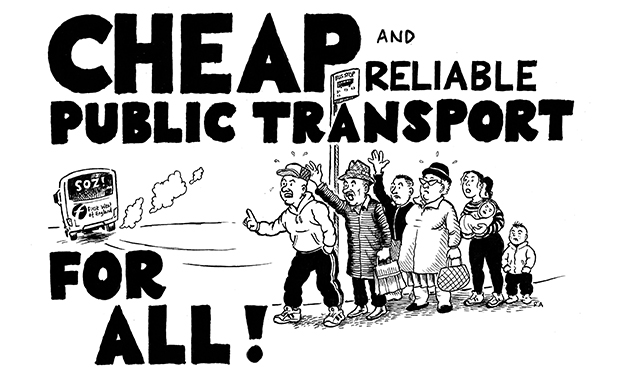At 6.00am on Tuesday 11 March 2025, refuse workers employed by Birmingham city council initiated a comprehensive indefinite strike. The walk-out followed a series of limited strike actions that binmen had been taking since the beginning of the year, and which had eventually culminated in a more militant response owing to the intransigence of the current council commissioners.
The origins of this dispute can be traced back to September 2023, when Birmingham city council issued a Section 114 notice. This notice, issued under the terms of the 1988 Local Government Act, effectively declared the council insolvent. At the time of the notice’s issuance by the council’s financial officer, an £87m deficit remained unresolved.
In accordance with the Local Government Act, the Westminster government appointed commissioners (in effect, administrators) to scrutinise the council’s financial records and implement cost-cutting measures to eliminate the deficit.
A growing wave of local authority bankruptcies
Birmingham city council is not alone in facing such financial struggles. It has joined eight other councils that have experienced insolvency in the last three years. These councils included Croydon in London, Thurrock in Essex, Woking in Surrey, and, just two months after Birmingham’s announcement, Nottingham city council also joined the list of bankrupt authorities.
Council finances have been driven into a ditch mainly because of the throttling of central government funding, which began with the austerity drive launched by David Cameron’s coalition government of 2010. This in itself was a response to the huge bank bailout instituted by Labour prime minister Gordon Brown during the financial crisis of 2008, the total cost of which was over £1tn.
The problems for many local authorities have been compounded because, with the tacit approval of the central government, they have speculated considerable sums of money on risky schemes, including not-for-profit energy companies, solar power farms and loan companies. It now transpires that those responsible for investing council funds in these harebrained schemes often had little to no understanding of the likely risks or returns.
And of course, having lined the pockets of assorted cronies and swindlers, they bear no personal liability for the consequent failures.
Birmingham goes bust after IT boondoggle and legal chicanery
In the case of Birmingham, the city’s fiscal troubles centred on two key liabilities: a £100m cost overrun on the implementation of a new Oracle IT system, which the council reportedly tried to customise (against advice) to their pre-existing processes. The subsequent delays and costs that resulted from this customisation process led then-council leader John Cotton to seek approval for the extra money needed. The council only approved £46.5m, less than half of what was estimated would be needed to fix the problems.
The second liability was an equal pay legal claim dating back to 2010. The case had been brought via employment tribunal by 4,000 female claimants who did all sorts of jobs, including cooking, cleaning and administration. The women’s upheld claim centred on the financial disadvantage they suffered by being left out of bonuses that were awarded in male-dominated fields of work, including attendance allowances. This meant that men could be earning up to 160 percent of the amount paid to women on the same pay grade.
At the time of their legal victory, solicitors estimated that the cost of compensating the affected female workers would be around £200m, but could be far higher if more female employees joined the existing claimants. In the end, the council spent (and is still spending) an estimated £1.1bn – a combination of legal fees fighting against the ruling and the compensation they were eventually forced to pay anyway. In some cases, the women concerned had to wait until 2024 and go through protracted negotiations via their unions to finally receive their settlements.
Binmen told to pay the price
Despite years of trying to balance the books via ever more draconian cuts to public services, the council finally admitted defeat and issued a Section 114 order in 2023. Commissioners, appointed to hack and slash the financial obligations of the council, determined that, in order to save costs, some of the refuse workers would be downgraded, and thus their pay reduced – in some cases by as much as £8,000 per year, a hammer blow to affected workers in the midst of an ongoing and seemingly neverending cost of living crisis.
And this was besides making huge cuts to social care and other essential services that have already been hacked back to the bone.
The all-out strike which began on 11 March has resulted in household refuse piling high in Birmingham’s suburban streets, with reports of dozens of rats, some quoted as being “the size of cats” scurrying from pile to pile in broad daylight. According to social media, when council-appointed agency refuse trucks arrived, some residents were reported to be scuffling in the streets, competing with their neighbours to dispose of their rubbish.
There appears to be little sign of a swift end to the dispute. On 25 March, Unite the Union, which represents the bin workers, criticised the council’s apparent reluctance to negotiate. According to Unite, there had been a full week between negotiation meetings with the council, which has refused to rule out further attacks on the terms and conditions of those refuse workers who are not affected by the present round of downgrading and pay cuts. Unite general secretary Sharon Graham asked:
“Are the council’s decision-making abilities being hobbled by unelected commissioners? If that’s the case, the council needs to be honest with its workers and the public and tell them exactly what decisions it can and cannot make without the commissioners’ permission.”
It should be pointed out that Sharon Graham leads a trade union that is a major donor to the same Labour party that led Birmingham city council into bankruptcy (and which also initiated the massive transfer of public funds to the bankers in 2008). Unite bankrolls Labour to the tune of millions of pounds of its own members’ money every year, yet at no point during this dispute (or indeed any other dispute with Labour-led councils affecting Unite members, of which there have been many) have Graham or her predecessors called the union’s continued and apparently unconditional funding of the Labour party into question.
And so the rubbish continues to pile and rot in the streets, the rats continue to run free and unfettered, and the lives of Birmingham’s working-class residents, already adversely affected by the cost of living crisis and brutal austerity measures, are made yet more unpleasant.
Councils across the length and breadth of the country have been in a parlous financial state for decades, but 15 years of austerity, imposed by Tory and Labour governments alike, means that many more councils, whose council tax rises are capped at 5 percent, will inevitably follow the likes of Birmingham, Nottingham, Croydon and others into bankruptcy.
It is working-class people who suffer the ill-effects of central government-sponsored austerity and local council profligacy. It is they who are deprived of the most basic services, suffering higher and higher council tax bills for less and less in return.
There is no choice for workers but to sweep aside all the ineffectual proposals for tinkering at the edges of this system that the ruling class and its apologists regularly put forward. It must be replaced by a planned socialist economy, in which both production and service provision are based on the needs of the people, and all services are free at the point of use, fully funded, and run by and for the working class.











